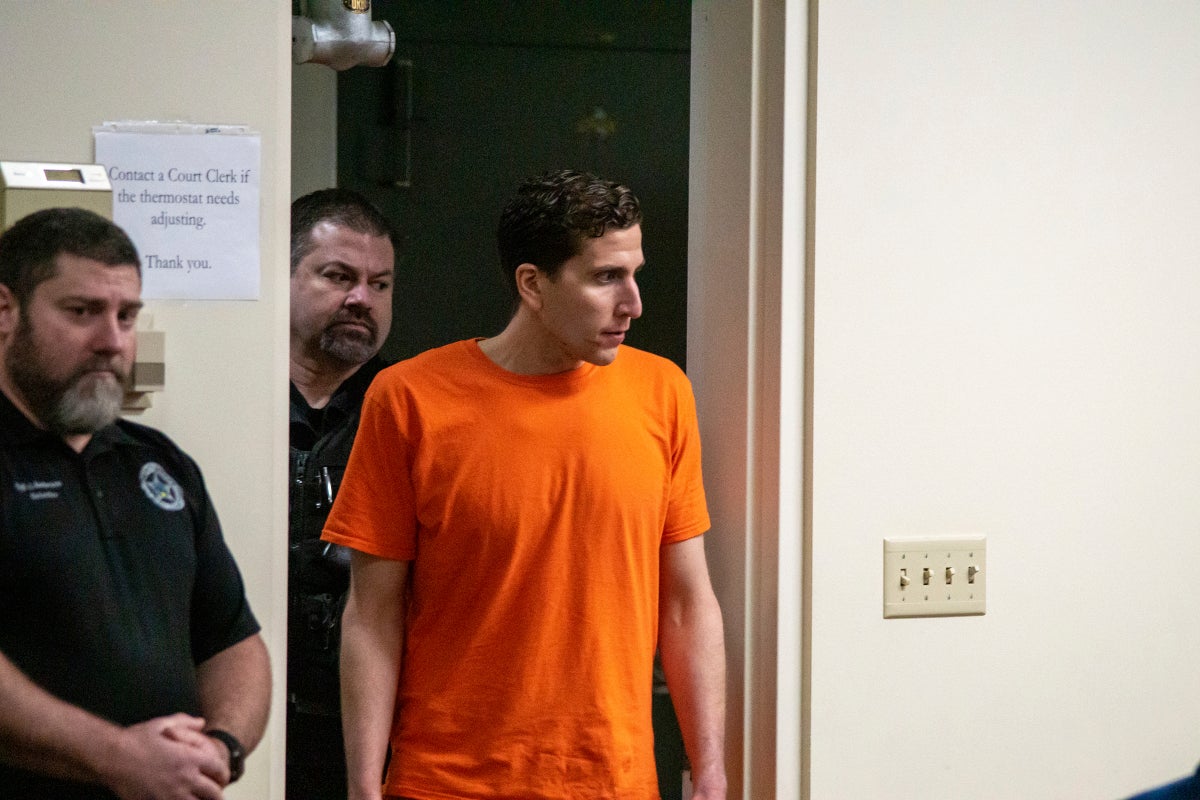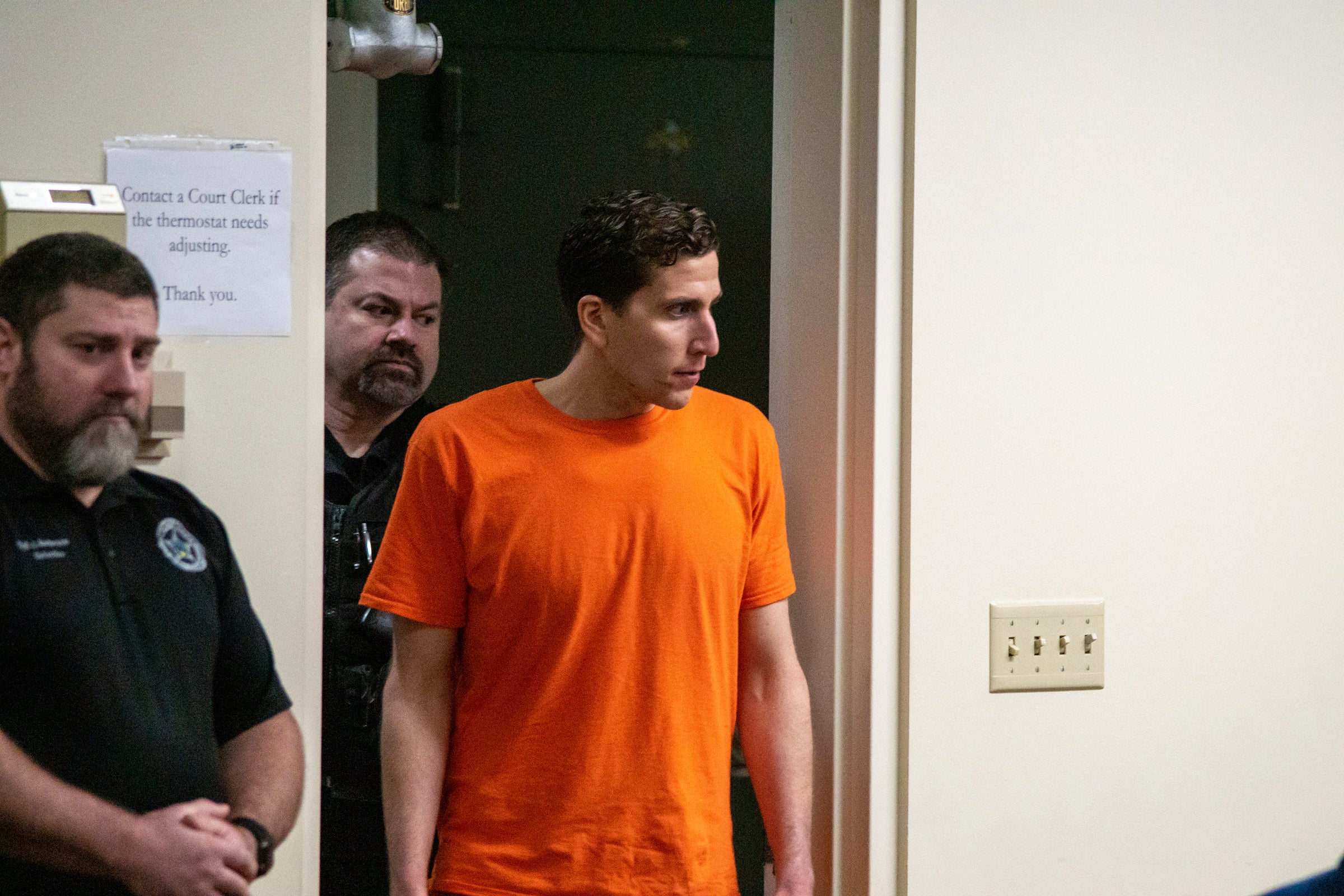
Chilling online posts allegedly written by Idaho murders suspect when he was a teenager have resurfaced, revealing his self-proclaimed lack of emotion and remorse.
Bryan Kohberher, 28, has been charged with four counts of murder in the brutal 13 November stabbings of University of Idaho students Madison Mogen, Kaylee Goncalves, Xana Kernodle and Ethan Chapin. A report by the New York Times on Wednesday offers new insight into the alleged murderer’s troubled teenage years and his struggle to feel emotion from a young age.
The Tapatalk profile behind the chilling posts from 2011 was linked to the Washington State University PhD criminology student with the help of recollections from former friends of Mr Kohberger, and a username match with an email account used by him, according to the Times.
Mr Kohberger had previously been described by high school friends as an intellectually gifted teen who often struggled to socialise and fit in. Some close to Mr Kohberger have also come forward saying he went from being awkward and bullied to developing an addiction to heroin and becoming a “bully” during his junior year of high school, according to a CBS News report.
But the posts from the online discussion forum, purportedly made when he was 16 years old, appear to reveal Mr Kohberger’s concerns about his suicidal ideation, challenges with a disorder he described as “visual snow” — a disorder that causes people to see static, and inability to connect with his relatives.
“I feel like an organic sack of meat with no self worth,” one post reads. “As I hug my family, I look into their faces, I see nothing, it is like I am looking at a video game, but less.”
In another post, the author explored feelings of self-loathing, regretting that he was no longer the “healthy blonde-haired boy with blue eyes, and in a few years, [he then had] darker hair and darker eyes, half the body weight”.
He then proceeded to say he felt “unintelligent” and as though he was experiencing “depersonalization” and felt “little to no remorse.’
“I often find myself making simple human interactions, but it is as if I am playing a role-playing game such as oblivion; I can see what is going on, I am slightly into it, but I can pause the game and focus on my real life,” the post states.
It continues: “I view everything as I would if I was playing oblivion, pointless and full of nothing, out of reality. I am moving out of my house, my last holidays were already lived, but where was I? As my family group hugs and celebrates, I am stuck in this void of nothing, feeling completely no emotion, feeling nothing.”
“I feel dirty, like there is dirt inside of my head, my mind, I am always dizzy and confused.”
The author went on to mention “regrets [he] predicts for [his] future self,” before saying he’d felt “eerie and alone” since he was 15 and did not wish to be alive anymore.
The last post made by the profile was on February 2017, with the author ominously writing that he’d come to terms with his visual snow, but adding it “could be a bad thing.”
More than a decade after the posts were made, Mr Kohberger is now the only suspect in the brutal November stabbings in Moscow.
Following an eight-week probe, investigators with the Moscow Police Department, Idaho State Police and the FBI gathered evidence that led to Mr Kohberger’s 30 December arrest in Pennsylvania, where he was spending the holidays with his family after finishing his first semester at WSU.
In an affidavit released after his extradition to Idaho last week, it was revealed that Mr Kohberger’s DNA was found in a knife sheath left behind next to the body of one of the victims.
Cellphone data also suggests that Mr Kohberger stalked the student home at least 12 times in the run-up to the night of the murders, according to the affidavit. The exact dates and times of these instances were not revealed in the affidavit but all bar one were in the late evening or early morning hours.

At the time of the murders, investigators believe Mr Kohberger turned his cellphone off in order to try to avoid detection.
However, cellphone data places him close to the home on King Road at around 9am on 13 November – suggesting that he returned to the scene of the crime just hours after allegedly murdering the four victims at around 4am.
As well as cellphone data and DNA evidence, the affidavit reveals that a white Hyundai Elantra spotted at the crime scene at the time of the murders was also traced back to the suspect.
One of the victims’ surviving roommates was also able to partially describe the killer to investigators after she came face to face with him in the aftermath of the murders in the early hours of 13 November.
The motive for the murders is unknown and it remains unclear why Mr Kohberger allegedly targeted the victims.
An attorney representing Goncalves’ family said that “no connection” had been found between the four students and the suspect.

Now, the families of the four victims will have to wait at least another six months before they can get more answers about their children’s murders, after his next court date was delayed until June.
Until then, Mr Kohberger will be held behind bars at Latah County Jail after he was ordered to be held on no bail for a second time.
As a criminal justice PhD student at Washington State University, Mr Kohberger lived just 15 minutes from the victims over the Idaho-Washington border in Pullman.
He had moved there from Pennsylvania to begin his studies in August and has just completed his first semester.
Before this, he studied criminology at DeSales University – first as an undergraduate and then finishing his graduate studies in June 2022.
While there, he studied under renowned forensic psychologist Katherine Ramsland who interviewed the BTK serial killer and co-wrote the book Confession of a Serial Killer: The Untold Story of Dennis Rader, the BTK Killer with him.
He also carried out a research project “to understand how emotions and psychological traits influence decision-making when committing a crime”.
If you are experiencing feelings of distress and isolation, or are struggling to cope, The Samaritans offers support; you can speak to someone for free over the phone, in confidence, on 116 123 (UK and ROI), email jo@samaritans.org, or visit the Samaritans website to find details of your nearest branch.If you are based in the USA, and you or someone you know needs mental health assistance right now, call National Suicide Prevention Helpline on 1-800-273-TALK (8255). The Helpline is a free, confidential crisis hotline that is available to everyone 24 hours a day, seven days a week. If you are in another country, you can go to www.befrienders.org to find a helpline near you.






